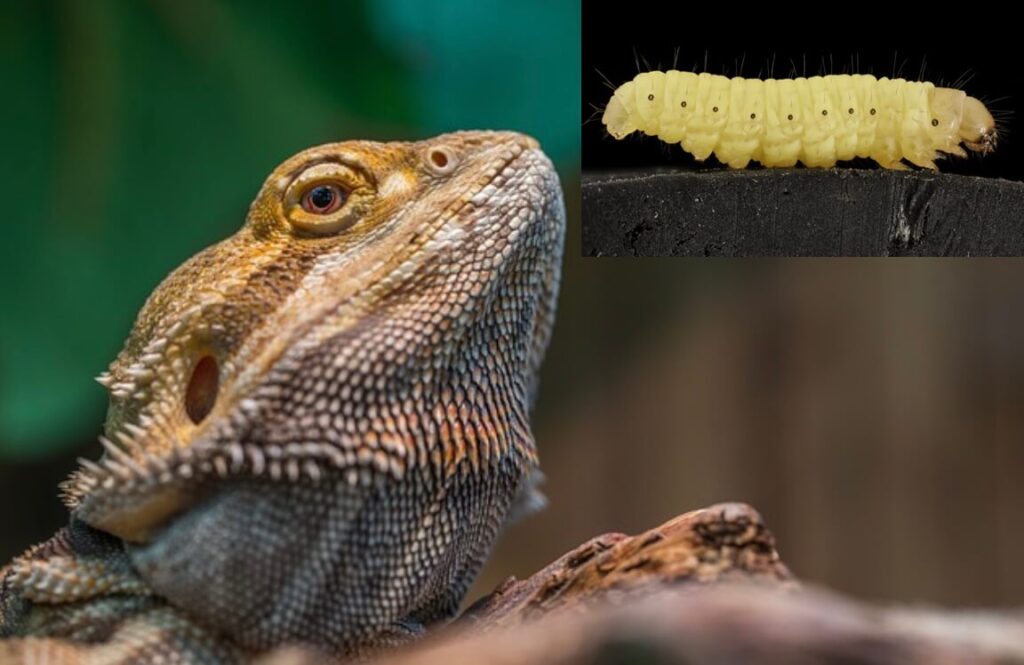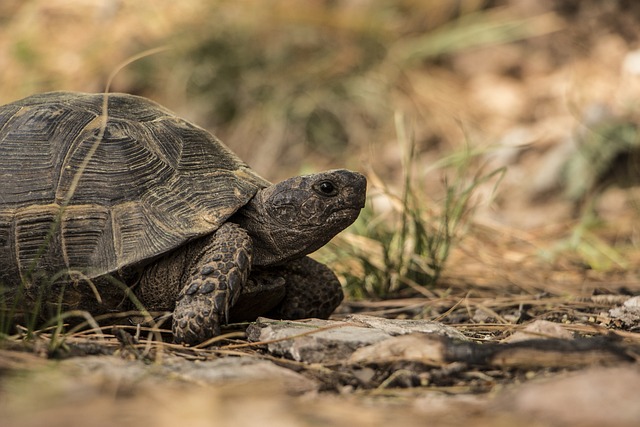If you’re wondering “Can bearded dragons eat wax worms?,” the answer is a qualified yes. Bearded dragons can eat wax worms because they’re high in protein. However, they should be eaten in moderation because they’re also high in fat.
Wax worms are a wonderful food source for your bearded dragon because of their nutritional value. As well, they’re easy to breed in captivity and can survive for several weeks in low temperatures.
In this article, we’ll explore the nutritional value of waxworms for bearded dragons and how to feed them properly. As well, see our full guide on feeding beardies worms here – Can bearded dragons eat worms?
Can bearded dragons eat wax worms?
- Can bearded dragons eat wax worms?
- Wax worm Nutritional Value for Bearded Dragons:
- How often should you give wax worms to your beardie?
- Should I feed my baby bearded dragon wax worms?
- Cons associated with feeding wax worms to your bearded dragon:
- What to do if your bearded dragon eats pesticide covered wax worms accidentally?
- Frequently Asked Questions (FAQ): Can bearded dragons eat wax worms?
- Foods bearded dragons can eat:
- Getting your bearded dragon calcium:
- Vegetables to feed your bearded dragon:
- Insects to feed your bearded dragon:
- How often should you feed a bearded dragon?
- What should a bearded dragon not eat?
- Recap: Can bearded dragons have waxworms?
Wax worm Nutritional Value for Bearded Dragons:
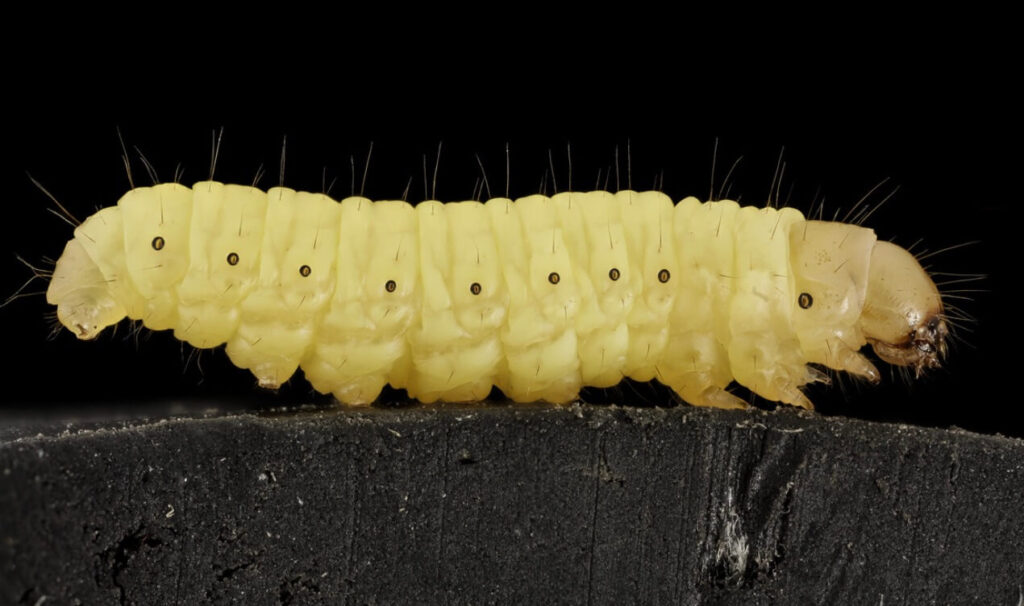
Wax worms are the caterpillar form of wax moths. They’re small to medium in size, have white bodies, black tipped feet and usually black or brown heads. They provide immense nutritional value to bearded dragons because they have large amounts of protein, which your pet needs to grow and sustain their bone health. They also contain high levels of vitamins, Magnesium, Iron, and importantly – calcium. Calcium is vital for a bearded dragon’s health.
How often should you give wax worms to your beardie?
While wax worms do contain protein and calcium, they are quite high in fat. Because of this, they shouldn’t be fed to your bearded dragon daily. You can safely give your bearded dragon waxworms about two times a week, at most.
Adult dragons can eat about three times a day with between ten to fifteen worms per serving. Young and growing bearded dragons should eat about five times a day, with between ten to twenty worms per serving.
Of course, this depends on how many other insects you’re feeding your bearded dragon. If you’re also giving them roaches, crickets, and lots of plant matter, you can give them less waxworms. Test out what mixture of insects and vegetables your bearded dragon loves most by observing what leftovers they leave behind. Over time, you’ll develop the perfect daily concoction that fits your particular pet, and that will keep them healthy and happy.
Should I feed my baby bearded dragon wax worms?
Yes! It’s great for baby bearded dragons to eat wax worms. They are small enough and don’t have too hard an outer shell to pose a choking hazard for them, and they’re a great worm to feed growing bearded dragons.
Cons associated with feeding wax worms to your bearded dragon:
If you give your bearded dragon a wax worm you find outside, there’s always a chance it’s covered in insecticide or pesticide. When your dragon ingests this pesticide, it could poison them and cause them serious harm and distress. That’s why store bought or home raised worms are safest.
Another con with feeding wax worms to your bearded dragon is that if you give them too many wax worms, they could gain weight rapidly. Bearded dragons, especially ones kept in captivity, are prone to obesity. Make sure you’re monitoring their weight, and to reduce the intake of high fat foods in their diet if you notice a sharp untick in their weight.
What to do if your bearded dragon eats pesticide covered wax worms accidentally?
Don’t panic. Immediately stop your bearded dragon from eating the worms, and closely monitor them closely for symptoms of a strong reaction. This reaction could include:
- Bloating
- Diarrhea
- Vomiting
- Spitting up
- Abnormal behaviors
Give them lots of water to flush out the chemicals as well as a warm bath to calm them down and to encourage a bowel movement. If the reaction worsens or you’re noticing anything out of the ordinary, call a vet immediately.
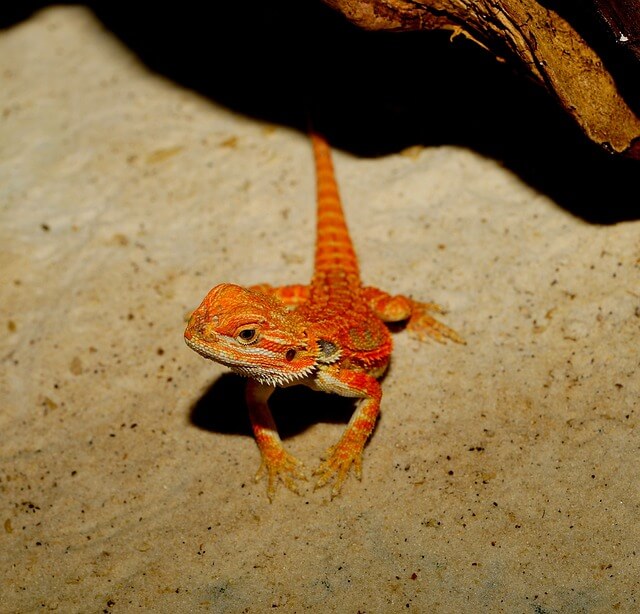
Frequently Asked Questions (FAQ): Can bearded dragons eat wax worms?
Can juvenile bearded dragons eat wax worms?
Yes, juvenile bearded dragons can eat wax worms, and they often need to eat more worms and insects than adult bearded dragons. Feed them five to ten wax worms every few days.
Are wax worms or mealworms better for bearded dragons?
It’s hard to say, because both wax worms and mealworms have protein, calcium, fat, and phosphorus. However, in general, most wax worm species will have more protein and less fat content than mealworms, so I’d say you should feed wax worms to your bearded dragon over mealworms.
What are the healthiest worms for bearded dragons?
Superworms are full of nutrition and fat and a great healthy worm for bearded dragons. They are especially healthy for underweight bearded dragons. If you’re monitoring your dragon’s weight, silk worms are also highly nutritious and contain less fat than superworms.
Can Beardies eat wax worms daily?
Yes, technically bearded dragons can eat wax worms daily. However, make sure to keep an eye on your beardie’s weight. Wax worms are high in fat and bearded dragons are prone to obesity, so keep an eye out for any rapid and sudden weight gain.
Are worms or crickets better for bearded dragons?
In general, crickets have more fiber than worms,and they also have a better calcium to phosphorus ratio. You should feed your bearded dragon crickets daily, and worms on occasion.
What bugs can bearded dragons not eat?
Avoid feeding your bearded dragon these bugs:
- Any bug that glows, especially fireflies
- Lightning bugs
- Poisonous ants like red ants
- Ladybugs
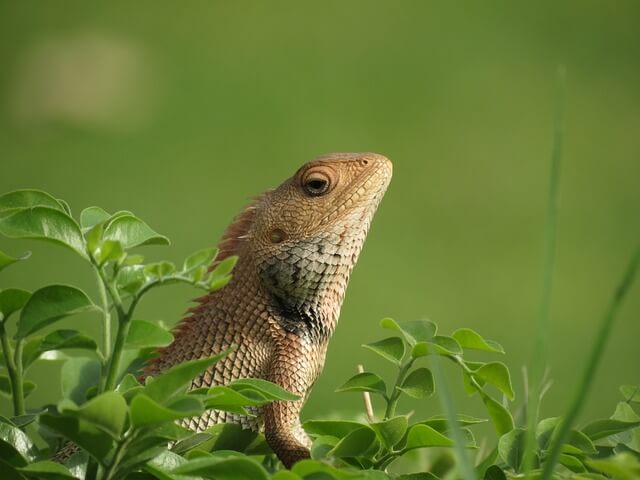
Foods bearded dragons can eat:
If you’re wondering what you should feed a bearded dragon, read our guidelines below. Bearded dragons are insectivores, which just means they thrive on insects as well as plant materials.
If you have a juvenile bearded dragon (between six and eighteen months old), give them about 80% vegetables and 20% live insects.
As your bearded dragon transitions into adulthood, give them the inverse, so 20% plant materials and 80% insects.
Getting your bearded dragon calcium:
Calcium is especially vital to a bearded dragon, especially a young one that is still growing. There are several ways to introduce more calcium into your beardie’s diet:
- Add in more high calcium vegetables like dandelions, bok choy, and collard greens.
- Dust calcium powder over their insects and vegetables to increase calcium levels.
- Make sure they’re getting their 12 hours of UVB exposure as they need this light to be able to properly absorb nutrients.
Vegetables to feed your bearded dragon:
- Peas
- Dandelion
- Green beans
- Cabbage
- Zucchini
- Pumpkin
- See our full list of vegetables to feed your bearded dragon
Note: Bearded dragons can also eat fruit in moderation. See here for a complete list of fruits bearded dragons can eat.
Insects to feed your bearded dragon:
- Crickets
- Kingworms
- Waxworms
- See our full guides to insects you can feed your bearded dragon and worms to feed your bearded dragon
Quick note: Live insects raised by you or bought from the pet store are best because they’re definitely pesticide free.
How often should you feed a bearded dragon?
During the first 3-6 months of your beardie’s life, try to feed them four to five times a day by giving them as many insects as they’d like in 10 minutes. They’re growing and need lots of protein during this stage.
Reduce the number of feedings to about two to three times a day when they’re growing into their juvenile years (between six and eighteen months).
As they become an adult, you can feed them once daily.
What should a bearded dragon not eat?
Avoid feeding your bearded dragon:
- Onions
- Leeks
- Chives
- Mushrooms
- Garlic
- Acidic fruit like oranges, lemons
- Rhubarb (can be toxic to them)
- Avocados (surprisingly, these make them ill)
- Eggplant
- Insects caught in the wild (there may be pesticides covering them)
- Venomous insects
- Dairy of any kind
- Rice and grains of any kind
- Frogs or toads
- Ham or other processed meats
Recap: Can bearded dragons have waxworms?
- Yes, bearded dragons can eat waxworms. They are full of protein and calcium which are great for beardies.
- However, try not to feed them wax worms daily as they also contain a large amount of fat, and can cause obesity in your dragon if fed to them too much.
For our full list of food to feed a bearded dragon, see our guide here.
Related articles:

